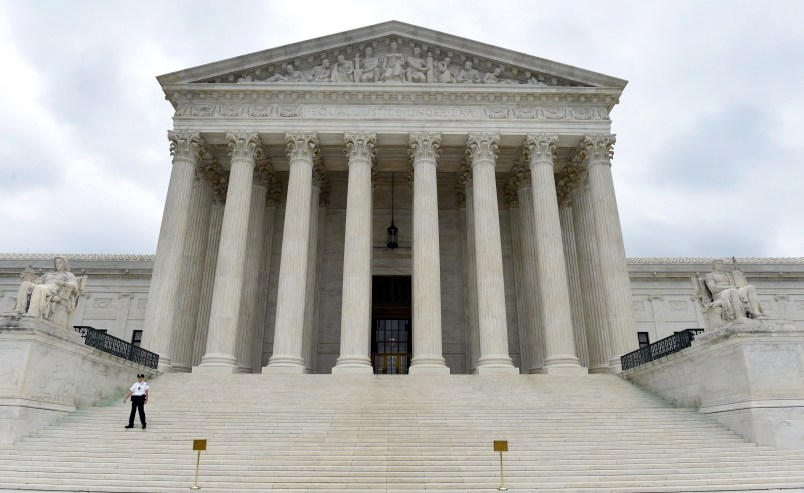The Texas Attorney General’s office on Friday asked the Supreme Court to review an appeals court decision striking down its voter ID law.
The appeal will not affect the November election, during which non-ID carrying voters will be able to sign an affidavit to vote, per a court-approved agreement between the state and the challengers who brought a suit against the 2011 voter ID law.
In Friday’s petition, Texas asks the Supreme Court to reverse the opinion of the majority of the full U.S. 5th Circuit Court of Appeals — considered the most conservative court in the country — which said that the law violated Section 2 of the Voting Rights Act because it had the effect of discriminating against minority voters.
“This Court’s review is necessary because the Fifth Circuit enjoined a law for ‘denying’ or ‘abridging’ the right to vote where plaintiffs presented no evidence that the law resulted in diminished minority political participation or prevented even a single person from voting,” Texas argued in its petition. “That holding turns VRA §2 on its head and creates a split with the Sixth, Seventh, and Ninth Circuits over the proper test for determining whether a voting prerequisite
violates VRA §2.”
Before the Supreme Court gutted a key part of the Voting Rights Act in its 2013 Shelby County v. Holder decision, Texas was twice blocked by the federal government from implementing the voter ID law, deemed one of the strictest in the nation. The Shelby decision dismantled Section 5 of the VRA, which said certain states with a history of discriminatory election practices had to get any changes to their voting protocols approved by either the Department of Justice or a panel of federal judges in Washington, D.C. Both the DOJ and the panel of judges refused to greenlight the Texas voter ID law.
Since the 2013 Supreme Court decision, there has been a wave of voting restrictions passed in states that previously were covered by Section 5’s “preclearance” provision. Voting rights advocates — in cases sometimes joined by the Department of Justice — sought to challenge these laws in court using Section 2 of the Voting Rights Act, which bans the abridgment or denial of voting rights on the basis of race. The Department of Justice is among the challengers in the Texas case, and the 5th Circuit decision was seen as a major victory in its use of Section 2 to block restrictive laws.
In some challenges to voting restrictions elsewhere, other appeals courts have ruled against voting rights advocates who have brought up challenges on the basis of Section 2.
Texas’ petition Friday as the Supreme Court to clarify the extent to which Section 2 can be used to strike down voting restrictions, particularly when it comes to what evidence can be used to prove that discrimination against minority voters is occurring.
“This Court has never decided a ‘vote-denial” or ‘vote-abridgement’ case under VRA §2’s results prong; its cases have all involved ‘vote-dilution’ claims,” Texas said in its petition, referring to redistricting cases that have involved Section 2.
It argued that that the 5th Circuit’s interpretation of Section was “jeopardizing countless election laws.”
“Any voting requirement imposes a marginally greater burden on poorer voters than more affluent voters because costs—whether measured in time, effort, or money—generally weigh more heavily on poorer voters,” Texas said. “Yet most voting practices are legitimate and uncontroversial despite their marginal
burdens.”
Read the full petition below:







I’m always curious where Robert’s comes down on these things. Kennedy too.
SCALIA’S STILL DEAD lolololol
Now fuck off
This is what happens when a state elects a moron for their attorney general. Paxton is a joke.
“This Court’s review is necessary because the Fifth Circuit enjoined a law for ‘denying’ or ‘abridging’ the right to vote where plaintiffs presented no evidence that the law resulted in diminished minority political participation or prevented even a single person from voting,” Texas argued in its petition.